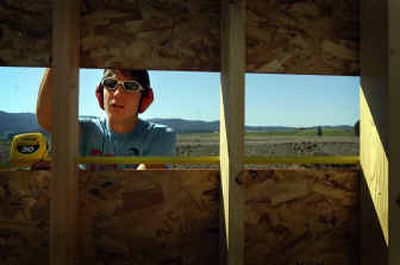Building a future

A house is more than board feet of lumber and bags of nails. It is more than a shelter to keep a family warm and dry.
A house, with walls for privacy and security; wiring and plumbing, heat and air conditioning; with a driveway and landscaping, is a product of many hands and skilled labor. Skills learned the hard way, through long days, good and bad weather and the patient tutelage of a mentor.
The housing market in the Inland Northwest is red hot. But new trades people so vital to homebuilding; the framers, plumbers, electricians and heating and air-conditioning technicians, among others, aren’t coming into the field.
Builder Dave Nerren, owner of Lexington Homes, is concerned. He is frustrated by the need to bring young, strong, trainees into the industry. Nerren came to the business as a young man, looking for a way to earn spending money for summer fun. After marrying and starting a family while still in his teens, Nerren realized that he needed to make a living to support that family.
He trained as a welder, worked as a carpenter on bridge construction projects, and at the age of 25 went into business as a general contractor. Now at age 48, Nerren owns Lexington Homes.
Nerren, who estimates that he has built more than 250 homes, but has been involved in the construction of more than a thousand homes, takes the job of mentor as seriously as his profession, and actively encourages young people to think about exploring a trade. He preaches this whenever he can.
“Spokane and North Idaho are on fire right now,” he says. “We should be encouraging young people, letting them know that there is a good living in this.”
He worries that schools and parents see working in a trade as being less than successful, instead of a time-honored way to earn a living. “We push young people into an over-crowded computer industry,” he says. “But who’s going to build homes to meet the demand if no one learns the skills?”
I see the value in what I do
At 21, Jonathan Balazs has already moved-up. Two years ago, he walked onto one of Nerren’s construction sites as an extra pair of hands.
“My job was pretty much assisting the general superintendent in whatever he needed,” he says. “Spreading gravel, digging ditches, caulking and sweeping up; just whatever needed to be done.” Now Balazs is framing, building walls and floors; the bones of any house.
His friends were getting jobs at fast food restaurants and from the onset he earned more than any of them. And he realized the satisfaction that comes from hard work done well.
“My friends would say they were tired, but I had been outside carrying lumber for nine hours,” he says. “I knew what tired was.”
Home-schooled, Balazs decided to wait, and work, before attending college. He says his parents would prefer him to be in school, but they support his decision.
“They would like me to be at school, and I’d like to take their advice,” he says. “But I’ve learned so much, and I’m just getting good at what I’m doing.”
Balazs, who loves music and plays the bass guitar in a band at his church, hasn’t ruled out college, but he is proud of having moved up, on track for earning good money doing a job that impacts other lives.
By studying the men who have trained him, and by watching the families whose houses he has helped build, Balazs has learned lessons that will stay with him wherever he goes.
“There is a pleasure that comes from knowing you were part of a house that is going to be someone’s home,” he says. “I see the value in what I do.”
We need to bring people in
Like Dave Nerren, Bruce Schafer, the framing supervisor responsible for guiding Balazs, believes in shepherding young people into the trade industry. “It’s unfortunate that our working community doesn’t always value the trades,” he says. “There is a lot to be said for hard work and on the job training.”
With business booming, and good summer weather ahead, Nerren sees no end in sight. And he wants to get the message to young men and women that they have options other than low-paying service industry jobs or white collar professions open to them.
“I can envision lots of ways to contribute and earn a good living in this business, and we need to bring people in,” Nerren says. “I can’t say it enough. It’s my passion.”